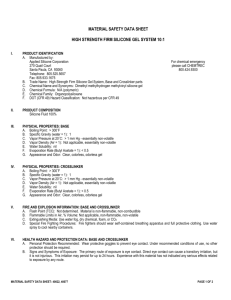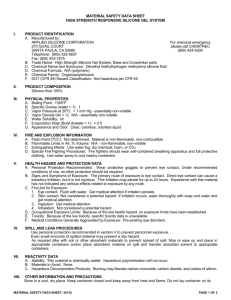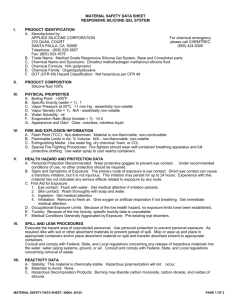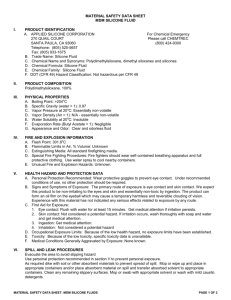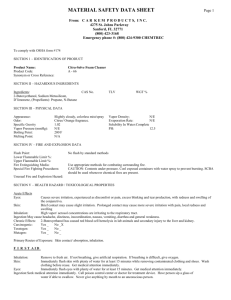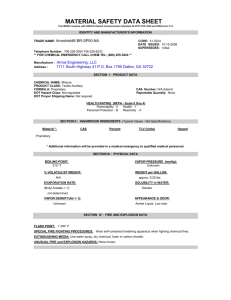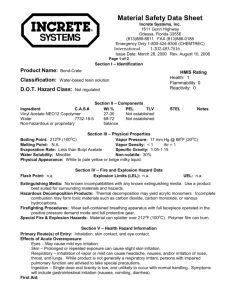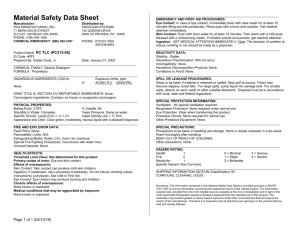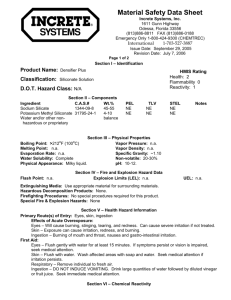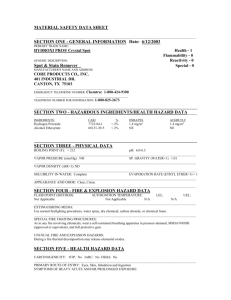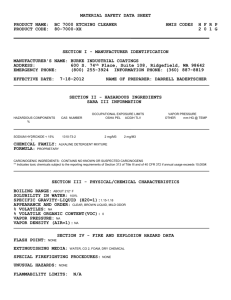MSDS - Applied Silicone
advertisement
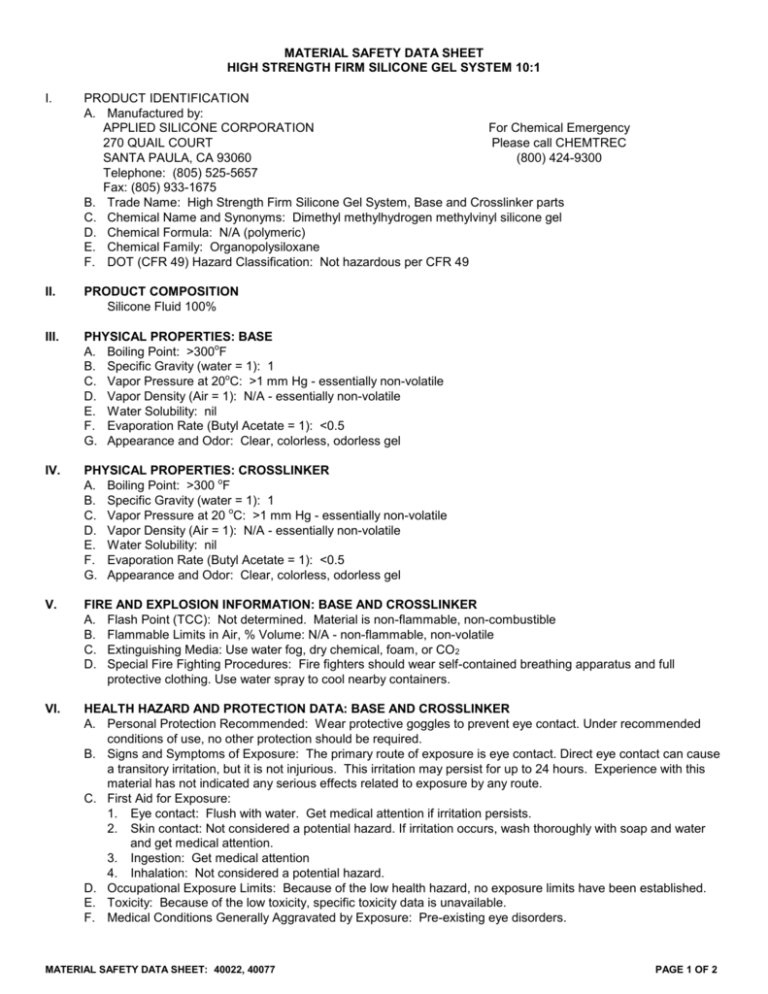
MATERIAL SAFETY DATA SHEET HIGH STRENGTH FIRM SILICONE GEL SYSTEM 10:1 I. PRODUCT IDENTIFICATION A. Manufactured by: APPLIED SILICONE CORPORATION For Chemical Emergency 270 QUAIL COURT Please call CHEMTREC SANTA PAULA, CA 93060 (800) 424-9300 Telephone: (805) 525-5657 Fax: (805) 933-1675 B. Trade Name: High Strength Firm Silicone Gel System, Base and Crosslinker parts C. Chemical Name and Synonyms: Dimethyl methylhydrogen methylvinyl silicone gel D. Chemical Formula: N/A (polymeric) E. Chemical Family: Organopolysiloxane F. DOT (CFR 49) Hazard Classification: Not hazardous per CFR 49 II. PRODUCT COMPOSITION Silicone Fluid 100% III. PHYSICAL PROPERTIES: BASE A. Boiling Point: >300oF B. Specific Gravity (water = 1): 1 C. Vapor Pressure at 20oC: >1 mm Hg - essentially non-volatile D. Vapor Density (Air = 1): N/A - essentially non-volatile E. Water Solubility: nil F. Evaporation Rate (Butyl Acetate = 1): <0.5 G. Appearance and Odor: Clear, colorless, odorless gel IV. PHYSICAL PROPERTIES: CROSSLINKER A. Boiling Point: >300 oF B. Specific Gravity (water = 1): 1 C. Vapor Pressure at 20 oC: >1 mm Hg - essentially non-volatile D. Vapor Density (Air = 1): N/A - essentially non-volatile E. Water Solubility: nil F. Evaporation Rate (Butyl Acetate = 1): <0.5 G. Appearance and Odor: Clear, colorless, odorless gel V. FIRE AND EXPLOSION INFORMATION: BASE AND CROSSLINKER A. Flash Point (TCC): Not determined. Material is non-flammable, non-combustible B. Flammable Limits in Air, % Volume: N/A - non-flammable, non-volatile C. Extinguishing Media: Use water fog, dry chemical, foam, or CO2 D. Special Fire Fighting Procedures: Fire fighters should wear self-contained breathing apparatus and full protective clothing. Use water spray to cool nearby containers. VI. HEALTH HAZARD AND PROTECTION DATA: BASE AND CROSSLINKER A. Personal Protection Recommended: Wear protective goggles to prevent eye contact. Under recommended conditions of use, no other protection should be required. B. Signs and Symptoms of Exposure: The primary route of exposure is eye contact. Direct eye contact can cause a transitory irritation, but it is not injurious. This irritation may persist for up to 24 hours. Experience with this material has not indicated any serious effects related to exposure by any route. C. First Aid for Exposure: 1. Eye contact: Flush with water. Get medical attention if irritation persists. 2. Skin contact: Not considered a potential hazard. If irritation occurs, wash thoroughly with soap and water and get medical attention. 3. Ingestion: Get medical attention 4. Inhalation: Not considered a potential hazard. D. Occupational Exposure Limits: Because of the low health hazard, no exposure limits have been established. E. Toxicity: Because of the low toxicity, specific toxicity data is unavailable. F. Medical Conditions Generally Aggravated by Exposure: Pre-existing eye disorders. MATERIAL SAFETY DATA SHEET: 40022, 40077 PAGE 1 OF 2 MATERIAL SAFETY DATA SHEET HIGH STRENGTH FIRM SILICONE GEL SYSTEM 10:1 VII. SPILL AND LEAK PROCEDURES: BASE AND CROSSLINKER Use personal protection recommended in section VI to prevent personnel exposure. Even small amounts of spilled material may present a slip hazard. As required dike with soil or other absorbent materials to prevent spread of spill. Mop or wipe up and place in appropriate containers and/or place absorbent material on spill and transfer absorbed solvent to appropriate containers. VIII. REACTIVITY DATA: BASE AND CROSSLINKER A. Stability: This material is chemically stable. Hazardous polymerization will not occur. B. Materials to Avoid: None. C. Hazardous Decomposition Products: Burning may liberate carbon monoxide, carbon dioxide, and oxides of silicone. IX. OTHER INFORMARTION AND PRECAUTIONS: BASE AND CROSSLINKER Store in a cool, dry place. Keep container closed and keep away from heat and flame. Do not lay container on its side. To the best of our knowledge this material does not contain any substances listed by the state of California to cause cancer, birth defects, or other reproductive effects. When this material is discarded, as received, it is not classified as a RCRA hazardous waste. State and local laws may impose additional regulatory requirements regarding disposal. Consult and comply with federal, state, and local regulations concerning any release of hazardous materials into the water, water piping systems, ground, or air. Consult and comply with federal, state, and local regulations concerning removal of waste. All information appearing herein is based upon data considered to be accurate. However, no warranty is expressed or implied regarding the accuracy of these data or the results to be obtained from the use thereof. EFFECTIVE: FEBRUARY 2, 2006 PREPARED BY: A. CORTEZ MATERIAL SAFETY DATA SHEET: 40022, 40077 PAGE 2 OF 2
